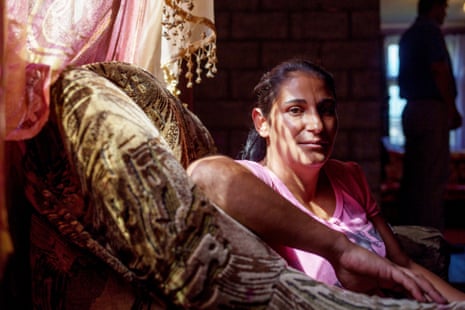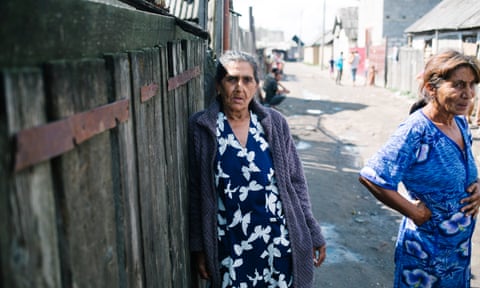The Roma mother pulls her young daughter close as she describes how her family’s home in western Ukraine’s Ternopil settlement was attacked and razed.
“People wearing masks attacked us,” says Iryna, 42, who fled with her two children. “Inside our home were our documents, and money we had been saving, but everything was burned.”
They have been taken in by another family living near the now-abandoned settlement. “We had a police guard for two weeks but don’t feel safe here. We stayed here because we want justice.”

However, police stand accused of failing to protect the Roma from a growing number of ethnically-motivated attacks by far-right groups. In recent months there have been at least eight brutal incidents, with two people killed and others injured.
Marking the start of the wave of violence was an arson attack on the Lysa Hora nature reserve settlement in Kiev on 21 April by roughly 30 members of C14, a neo-Nazi group. Police arriving at the scene allegedly failed to protect the families and instead advised them to leave Kiev.
Similar attacks followed. In early July, a Romani woman was stabbed to death in Zakarpattia Oblast in the eighth violent incident against Roma in less than three months. The perpetrators have not yet been identified.
The previous month, a man in his early 20s was killed and others injured – including a 10-year-old boy – after masked men raided a Romani community outside Lviv.
David Popp, who made a living collecting plastic bottles and scrap metal, was stabbed in the head and chest by a suspected ultranationalist gang member.
Eight men who allegedly tore through the settlement, attacking dwellings with knives and chains, were arrested. But there has been criticism the police are not doing enough.
“The failure of national police to adequately respond to at least eight violent incidents … and harassment involving public officials, is fostering a culture of impunity,” says Neil Clarke of Minority Rights Group International.
After the Ternopil attack in May, Andriy, a 43-year-old Romani whose house is on the outskirts of the city, took in some of the people who had lost their homes.
“I have lived here for 10 years and I don’t know what Roma have done to these nationalists. I don’t know why they have attacked us and I have no idea what will happen next,” he says.

- Andriy took in some people after they were attacked in Ternopil
Regina, 23, now staying with Andriy after fleeing the settlement, thinks the Russians are responsible for fuelling tensions. “Maybe the Russians are behind it and trying to destabilise Ukraine. After this attack we feel very anxious. If we hear a dog barking, we run to see who it is. I used to always go to the shop at 10pm but now I won’t go out later than 6pm.”
Against the backdrop of Ukraine’s confrontations with Russia and corruption-riddled domestic politics, extreme nationalist groups such as C14 and others have become increasingly popular in recent years.
Animosity towards Roma, who live in tarpaulin camps and abandoned buildings in and around Kiev, is high with many residents complaining the Roma settlements are unsightly and messy.



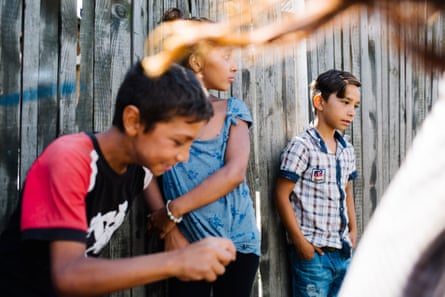
- Scenes in and around Roma encampments on the outskirts of Beregovo and Uzhgorod, western Ukraine
They have become an easy target for far-right groups, with tensions stoked by the authorities allegedly turning a blind eye.
Now the European Roma Rights Centre (ERRC) is suing the national police for failing to investigate the attacks properly, and for negligence in protecting the Romani citizens from ethnic violence. Along with the National Roma Centre, they will allege failings under the European convention on human rights.
They claim there is growing evidence of collusion between the national police and far-right militias. Activists allege that, after the attack in Ternopil, a Romani woman said: “I don’t trust the police. The next day I saw the police officer drinking coffee with one of the guys who attacked our camp.”
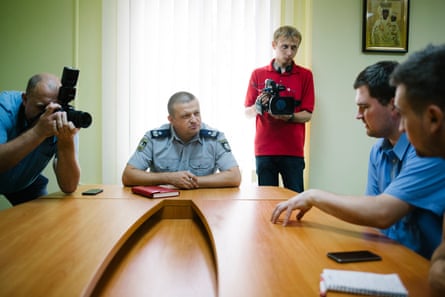
The head of the police in Ternopil, Oleksandr Bohomol, met with Volodya Navorotskyy and Jonathan Lee from the ERRC.
Bohomol told them he regretted that such a shameful act should have happened in the region, and said the police under his control had been very proactive in terms of protection measures, and reacting to and preventing further attacks. “In my opinion this was planned by someone we don’t know,” he said, “we have a not very friendly neighbour to this country and it looks like the worse the situation is here, the better he feels.”
Lee told the Guardian he thinks Bohomol and many others blame Russia for the attacks.
“Ukraine is a wartime country and people look for an enemy in everything,” he says.
“The fact remains however, that regardless of who is funding these far-right groups, these attacks were carried out by young Ukrainian men who needed no encouraging to go and attack Romani families. This is a Ukrainian problem, which reflects the level of deeply entrenched anti-gypsyism in society.”
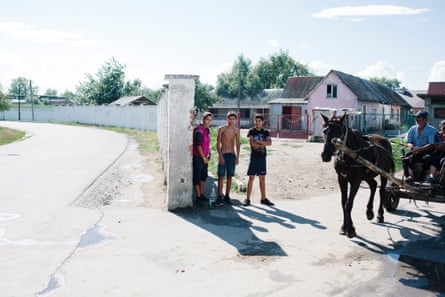
- A walled-off Romani settlement in Beregovo
In the town of Beregovo lies a walled-off settlement where many fleeing the violence have returned after many years. More than 5,000 people inhabit the area, which the Roma have called home since the 1860s. Most houses have no running water, electricity or gas, and work is scarce.
Ali used to work in Kiev but has returned to Beregovo while he plans his exit strategy. “I will get a passport for foreign travel – my family hope to get Hungarian citizenship so we can be safe.”
He was returning from work when friends and relatives survived an attack on the Lysa Hora nature reserve in Kiev in April.
“They had sought refuge at the train station when a ‘friend’ of the police called and said we were allowed to return to the camp. But when we got back there, nationalists were waiting and began shooting.”
Police did nothing until a video, showing terrified women and children fleeing gas and stones launched at them by masked men, went viral.


Illona, 65, was among those who fled to Beregovo. “They demolished our settlement and wanted to kill us,” she says.
“The police were asking the nationalists questions like they knew them, and they warned us. They told us: ‘Get your things, some people will come.’ The police knew what was going to happen but they didn’t stop it.”
Daryna is the unofficial matriarch at a Roma settlement in the western city of Uzhgorod. She looks after people and deals with the local authorities.
She grew up with Ukrainians, Russians and Lithuanians, and says relations have changed in recent times.
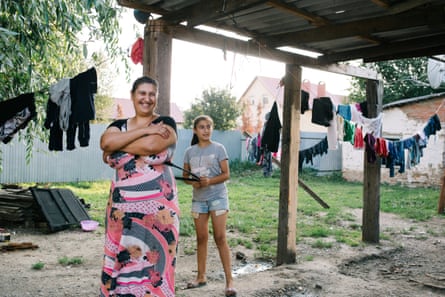
“When I was young we were friends, chatting and playing. Now white kids and Roma kids see themselves as totally different.
“Our kids have no friends from outside the settlement and are abandoned here. Last week, when I went to the store, there were white kids calling us ‘dirty gypsies’ and saying: ‘Why are you here?’” She says she blames their parents. “They make their kids hate us.”
Nadiya, 45, who lives in the same settlement, agrees things have got worse.
Surrounded by framed photos of her family dating back several generations, she explains: “The city is dividing us. Here they have built a wall around us because they don’t want customers at a new car wash to see Romani people here.
“The attacks continue and, if the authorities do not step in to prosecute these people and bring justice, then in three or four years time we will find ourselves completely cut off from society.”
